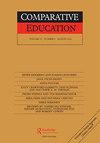比较教育和国际关系
IF 3.7
1区 教育学
Q1 EDUCATION & EDUCATIONAL RESEARCH
引用次数: 2
摘要
本文将比较教育解释为一门与国际关系纠缠在一起的知识。它力求从国际关系的三个主要传统,即现实主义、理性主义和革命主义中提取过去和现在比较教育思想和行动的形式和模式。具体地说,这三种传统中的每一种都提供了对国际社会性质及其主要行动者如何在其中行事的不同理解。这些对国际政治本质的不同理解使得人们对教育界的思考和行动方式相对不同。结论中强调了这种对比较教育的解释对未来的影响。本文章由计算机程序翻译,如有差异,请以英文原文为准。
Comparative education and international relations
ABSTRACT The article offers an interpretation of comparative education as an episteme that is entangled with international relations. It does so by seeking to extract past and present forms and patterns of comparative educational thought and action from the three main traditions of international relations, namely: realism, rationalism and revolutionism. It is specifically argued that each of these three traditions offers different understandings of the nature of international society and how its main actors conduct themselves in it. These different understandings of the nature of international politics enable different ways of thinking about, and acting upon, the educational world comparatively. The implications of this interpretation of comparative education for the future are highlighted in the conclusion.
求助全文
通过发布文献求助,成功后即可免费获取论文全文。
去求助
来源期刊

Comparative Education
EDUCATION & EDUCATIONAL RESEARCH-
CiteScore
7.40
自引率
21.20%
发文量
35
期刊介绍:
This international journal of educational studies presents up-to-date information with analyses of significant problems and trends throughout the world. Comparative Education engages with challenging theoretical and methodological issues - and also considers the implications of comparative studies for the formation and implementation of policies - not only in education but in social, national and international development. Thus it welcomes contributions from associated disciplines in the fields of government, management, sociology - and indeed technology and communications - as these affect educational research and policy decisions.
 求助内容:
求助内容: 应助结果提醒方式:
应助结果提醒方式:


